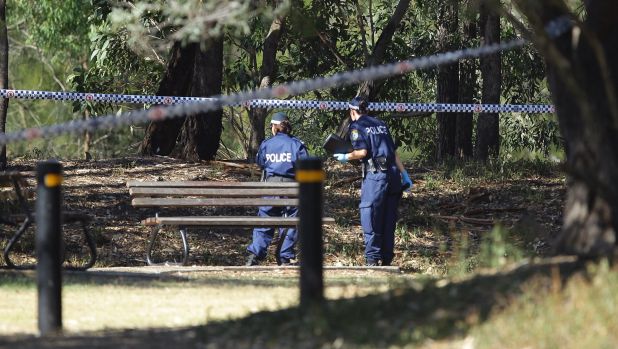In his decades in the police force, Homicide Squad Detective Inspector Mark Henney has never been confronted with such a baffling case.
How could a quiet, single man, with little interaction beyond his family and his work as a McDonald's restaurant manager, meet with such a brutal death?

On January 16, 2014, 34-year-old Darren Galea left work about 4.30pm. He stopped at a flower shop to buy some orchid bulbs, his only hobby.
At home in his small South Wentworthville bungalow, he laid his uniform on the back of a chair.
Over the next four to six hours, police believe Mr Galea was kidnapped by two men – either from his home or when he travelled elsewhere – bound by the wrists, taken to a small reserve at the Duck River in Auburn and shot in the head.
He was not dragged to his execution. He walked, perhaps calmly, and lost a rubber thong along the way. Nearby residents heard shots ring out at about midnight.
An hour later, his car was driven to the cul-de-sac he often parked in and torched with his phone and wallet inside.
A walker found his body by the Duck River at 6am, initially thinking it might have been headless.

It was a cold execution befitting of Sydney's underworld, far removed from Mr Galea's life.
"When you weigh it up, the way he was killed and the life he lived, it doesn't make sense," Mr Henney said.

Marking the third anniversary of his death, police and Mr Galea's family have appealed for any information about him, no matter how insignificant it may seem.
Ballistics testing on the bullet revealed the same gun was used in a drug-related shooting of a man in Auburn in 2012 and a Nomads bikie gang-related drive-by in Merrylands in 2011 targeting the Tajjour family, cousins of the notorious Ibrahim family.

Yet, there is nothing in Mr Galea's life to point towards a murder motive. He had no debts, no links to criminals, no social circle and no substantial relationships beyond his family.
His text messages and phone calls involved his parents, siblings and work. Every person he communicated with has been accounted for.

Money from managing McDonald's restaurants in Merrylands and Granville largely went to the mortgage for his home, where he like to grow orchids and tend to an aviary.
He didn't use a computer and his electronic footprint was negligible.

"Normally, with victimology, we would ask: 'Who did they associate with? Who were they in communication with? Let's go through the list of people he knows' but in this case, there is nothing," Mr Henney said.
In a strange move, Mr Galea's killers travelled to their victim's home an hour later – despite the chance police might already have known of the murder – to park his car.
A nearby camera captured another set of headlights going in and out of the street. Mr Galea's car was then found burnt out.
Police have previously appealed for information about an old white Toyota Corolla with two men seen in the area as well as any sightings of Mr Galea's different model white Corolla.
The fact he was bound and walked to his death offers a small clue.
"Ordinarily, that would suggest they want something or they want information," Mr Henney said. "All we know is that these people knew Darren and they wanted something from him."
For Mr Galea's father, who passed his love of orchids on to his son, a small orchid in his home just down the road from his late son's is one of few lasting memories.
The orchid, propagated by the Parramatta & District Orchid Society in Mr Galea's memory, is also a daily reminder of the answers the family don't have.
"He used to work hard, he used to be generous with everybody, that's why we don't know what happened," his father said. "One day he went out and didn't come back. That's all we know."

